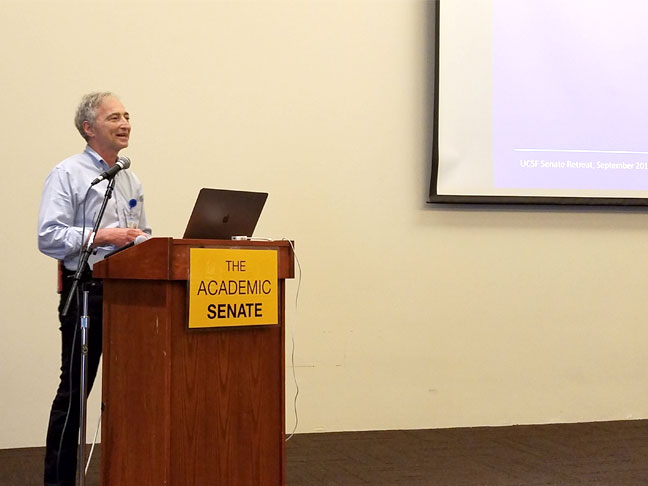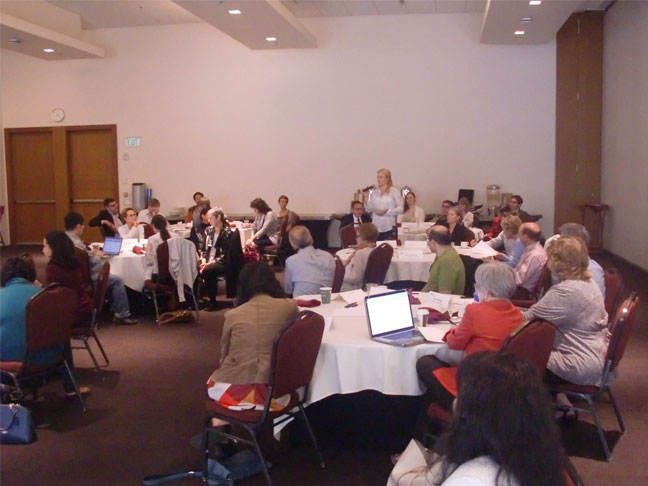Senate Leadership Retreat
The UC San Francisco Academic Senate held its annual leadership retreat on Saturday, September 9, at the Mission Bay Conference Center. The Retreat serves as the start of the Senate’s year, and is a time for the leadership of the senate, including its incoming faculty council and standing committee chairs and vice chairs to meet each other, and to discuss anticipated issues and policy concerns.

UCSF School of Medicine, addresses the audience at the start of the event.
The new Senate Division Chair David Teitel, MD, Professor of Pediatrics in the UCSF School of Medicine, opened the event with an address to the faculty, providing an overview of the history of the Senate, and framed his vision as a ‘Call for Action’ over the next two years. In doing so, he reiterated the notion from former UC Berkeley Chancellor and UC President Clark Kerr that, “The two greatest gifts to the University of California have been the institutional autonomy given to its Board of Regents in the Constitution of 1878 and the unprecedented grant of authority the board assigned to the Academic Senate in 1920.”
Chair Teitel sees the Senate as not only a body that acts as a liaison to the Administration by representing faculty concerns, but also as one that is responsible for the shared governance at UCSF. The shared governance is defined by Regents Bylaw 40, which grants the Senate strict authority over admissions, curricula, and degrees. The Senate also articulates the voice of the faculty in a number of other critical areas, including planning and budget, faculty welfare, and research, to name just a few.
Teitel is a pediatric cardiologist who has been at UCSF since 1980, when he came as a fellow, joining the faculty in 1982. He has previously served as a member and chair of the Senate’s Committee on Academic Planning and Budget (APB), the Committee on Educational Policy (CEP), the Committee on Library and Scholarly Communication (COLASC), and the Academic Information Systems Board. Chair Teitel feels strongly that the Senate directly participates in shared governance through the Senate’s standing committees, faculty councils, and special task forces and workgroups. This governing role is rare among faculty associations in major universities in North America and is the reason that Kerr stated that, “the academic success of the university is based more on the contributions of the Academic Senate than on any other factor.”
Chair Teitel remarked, “When I came to UCSF I was looking for a service opportunity that supported my strong belief in the importance of employees in the management and direction of their organization. I felt that the Academic Senate afforded me that opportunity, to contribute in this ‘union’ model of shared governance.”

and vice chairs listen to different presentations at the event. The retreat
was a time for them to meet each other.
During the leadership retreat, committee chairs and faculty council chairs briefly reflected on the accomplishments from the past year, which are summarized in the 2016-17 Senate’s Office Report. In concert with Teitel’s “Call for Action,” Senate leaders focused much of their discussion on their plans for the coming year and key areas of committee interest. Some of these issues include:
- Faculty Advancement/Promotion: The Committee on Academic Personnel (CAP) will work with the Schools to develop UCSF-specific criteria for advancement/promotion reviews of Health Sciences Clinical and Clinical X faculty, which becomes active in the Academic Personnel Manual (APM) on July 1, 2018. CAP will also collaborate with the Office of the Vice Provost, Academic Affairs and Faculty Development (VPAA) to examine definitions and guidelines for In Residence faculty.
- Indirect Cost Recovery (ICR): Both APB and the Committee on Space (SPC) will make indirect costs a major focus of their activity this year. Of particular interest is an update and refinement of indirect cost recovery metric used to evaluate space utilization and productivity. Indirect costs, as they relate to space at UCSF, will be discussed at the next Senate Division meeting on October 26 at Parnassus, Health Sciences West Building in room 302. With respect to ICR, Chair Teitel commented that the Senate’s goal is to work in collaboration with the Administration to increase understanding of indirect costs, both as a driver for research and administrative campus space policy review and to prepare for any possible federal changes.
- Retiree Health: The future of retiree health will be discussed across the UC system this year. Of particular interest is a proposal from last summer to remove the 70% floor for aggregate expenditures on retiree health, and allow placement of a cap on the rate of growth of the maximum UC employer contribution to an individual retiree’s health coverage at 3%. The Committee on Faculty Welfare (CFW) will take the lead in formulating and communicating the Senate position on this important issue.
- UCSF-wide Space Management and Development: Many issues related to space exist on campus, such as the policy for assigning and overseeing research space and its administration, renovations of existing space (Mission Hall, CSB, etc.), creation of new space (Building 33, the Precision Medicine and Neurosciences building), and the governance of existing space. Because these issues are urgent and critical to the University’s missions, the Senate created a new committee focused solely on space. The newly formed SPC will address not only the 2013 Campus Research and Administrative Space Policy, which is being revised, but also the renovations and new buildings noted above and University space policy as it relates to clinicians and educators.
- Future of Parnassus: The Senate is committed to ensuring that Parnassus remains a strong flagship campus to attract and retain key faculty and trainees. In order to clearly demonstrate the importance of the research-clinical care connection, APB, Committee on Research (COR), and SPC will work with the Administration to ensure that research activities are included in both the clinical space and the strategic planning of the Parnassus projects. These committees will collaborate with the EVCP Office to identify what the appropriate areas of investment for Parnassus and the implications, bearing in mind current constraints (e.g., current investment in Mission Bay, UC Hall and CSB projects, etc.).
- Faculty Climate: Subsequent to the recent publication of the Faculty Climate Survey and the Faculty Family Friendly Initiative (3FI), CFW and the Committee on Equal Opportunity (EQOP) are working with Vice Provost Alldredge to develop an action plan to implement recommendations from those reports. The plan will be presented to the Chancellor’s Cabinet by the end of the year. While the majority of faculty members are satisfied with their careers at UCSF, there is room for improvement, particularly related to campus climate for women, balancing work and family life and financial challenges of living and working in San Francisco. CFW and EQOP are looking for creative ways to address some of the climate issues identified in the Climate Survey.
- Review of Organization Research Units (ORUs) & Research Partnerships: COR will work closely with the Associate Vice Chancellor Research Infrastructure and Operations Brian Smith to review UCSF’s ORUs, many of which have never undergone a review since their initial establishment. COR will also look at the various forms of external partnerships within research that can be developed at UCSF.
- Interprofessional Education (IPE): The value of IPE includes better communication and understanding of clinicians’ roles across patient needs, making for more holistic, improved patient care. There is currently a search for an IPE Director. CEP will continue to concentrate on IPE, and is exploring the possibilities of having courses taught to students from all different, such as ethics, as well as engaging members on the type of benchmarks for success for IPE across UCSF.
- Pharmacy Curriculum Redesign: The Pharmacy Faculty Council and the Committee on Rules and Jurisdiction (R&J) plan to make proposed revisions to the PharmD curriculum, along with associated bylaw changes and clarifications. CEP will continue working with the SOP in an advisory capacity in this area.
- Late Course Submissions: The Committee on Courses of Instruction (COCOI) and CEP will be working together to address the issue of late course submissions.
- Communication, Advocacy, & Engagement: The Senate continues to work on engaging all faculty through its committees and councils, Division meetings, faculty research lectures, Distinction in Teaching/Distinction in Mentoring awards, and other events. For 2017-18, the Senate will publish a regular electronic newsletter to inform faculty on important issues impacting them. In addition, the Clinical Affairs Committee (CAC) will focus on strengthening affiliate clinical faculty engagement by holding one of its meetings at an affiliate site. The Medicine Faculty Council has also designated broader communication to its faculty as one of its key goals for 2017-18.
Executive Vice Chancellor and Provost (EVCP) Daniel Lowenstein closed the Retreat with a presentation that outlined many of the key issues facing UCSF, which included Space, the future of Parnassus, faculty climate, IPE, UCSF’s capital campaign, and federal policy. He noted that the frequent, negative policies proposed by the federal government have created a need for UCSF to rapidly assess their impact and respond expeditiously. In doing so, UCSF continues to reaffirm and emphasize its core values of PRIDE, which have not and will not change. He also reported that UCSF has engaged a creative design firm to develop a capital campaign around the following three themes:
- Decoding life to improve health
- Leveraging discovery to revolutionize care
- Partnering to achieve health equity.
At the end of the Retreat, Senate faculty joined EVCP Lowenstein in honoring outgoing interim School of Nursing (SON) Dean Sandra Weiss, as UCSF prepares to welcome the new SON Dean Catherine Gilliss.
Created by UC Board of Regents Standing Order 105, the UC San Francisco (UCSF) Academic Senate is empowered to exercise direct control over such academic matters as admissions for degrees and curricula, which are of central importance to the University. The UCSF Division of Academic Senate provides an independent forum to discuss faculty-related campus wide academic concerns. In other areas, the Senate exercises an active advisory role. The Academic Senate works within the larger body of UCSF, a leading university dedicated to promoting health worldwide through advanced biomedical research, graduate-level education in the life sciences and health professions, and excellence in patient care.
